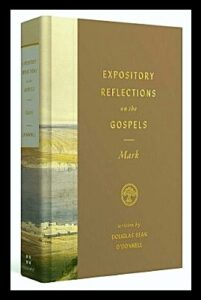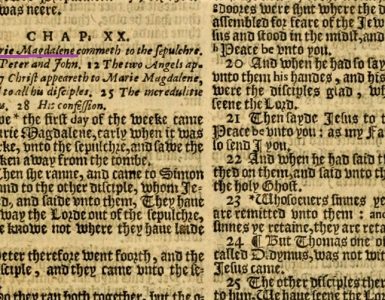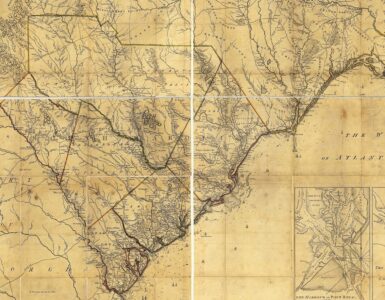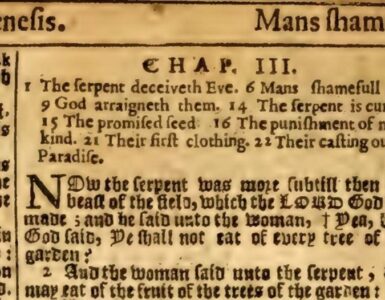 I appreciate the brevity and to-the-point presentation of the Gospel of Mark, so when I saw Douglas Sean O’Donnell’s recently released Expository Reflections on the Gospel of Mark, it piqued my curiosity sufficiently to purchase a copy because the title reminded me of J. C. Ryle’s inciteful Expository Thoughts on the Gospels for Family and Private Use. As it so happens the publisher, Crossway, had Ryle in mind in the planning stages and wanted to avoid using the word commentary in the series title. Dr. O’Donnell is senior vice president of Bible editorial at Crossway having edited over twenty books including seven Bible commentaries. The book on Mark is the first volume released in the Expository Reflections series. The author developed his exposition upon a series of sermons delivered while a minister in Illinois (xvii). The forty-seven chapters in Reflections on Mark average eleven pages with each chapter comparable to a short sermon or extended homily.
I appreciate the brevity and to-the-point presentation of the Gospel of Mark, so when I saw Douglas Sean O’Donnell’s recently released Expository Reflections on the Gospel of Mark, it piqued my curiosity sufficiently to purchase a copy because the title reminded me of J. C. Ryle’s inciteful Expository Thoughts on the Gospels for Family and Private Use. As it so happens the publisher, Crossway, had Ryle in mind in the planning stages and wanted to avoid using the word commentary in the series title. Dr. O’Donnell is senior vice president of Bible editorial at Crossway having edited over twenty books including seven Bible commentaries. The book on Mark is the first volume released in the Expository Reflections series. The author developed his exposition upon a series of sermons delivered while a minister in Illinois (xvii). The forty-seven chapters in Reflections on Mark average eleven pages with each chapter comparable to a short sermon or extended homily.
The book is attractively bound with its cover mimicking the appearance of a dustjacket. I find dustjackets bothersome when reading a book because they slip around and get in the way, so the design of Reflections on Mark provides convenience and a way to keep publishing costs down without compromising an attractive presentation. A subject index would ease using the book for those not reading it through. The author’s reflections include insights into themes, events, and individuals which a harried pastor might like to read as he remembers “I know I read that somewhere in O’Donnell,” so an index would be helpful. But the lengthy Scripture index may provide a backdoor to information bits as themes, events, and individuals mentioned in Bible passages are followed in place of subject references. The select bibliography is good to have along with the list, “Scripture Versions Cited.” The book shows scholarly spade work without extensive footnote insertions, is clearly written, and free of jargon.
I found his comments on Jesus’ temptation in the wilderness thought provoking. He observes that Adam was in a perfect and glorious garden, yet he did not resist Satan’s enticement; Jesus, the second Adam, was in a horrible situation for resisting temptation. The wilderness was oppressively hot, arid, and desolate, giving Satan a golden opportunity to bring the Lord into submission, but He did not yield. We can see from O’Donnell’s reflections that the wilderness temptation in Mark enhances our understanding of passages such as “For because he himself has suffered when tempted, he is able to help those who are being tempted” (Hebrews 2:18), and, “For we do not have a high priest who is unable to sympathize with our weaknesses, but one who in every respect has been tempted as we are, yet without sin” (Hebrews 4:15).
The author addresses the authenticity of Mark 16:9-20 in the chapter “Sometimes It (The Resurrection!) Causes Me To Tremble, Mark 16:1-8.” From the title, it is clear the author views verses 9-20 as questionable at best. When I turned to current English translations I found the verses were included in [ ] with an explanation such as “Some of the earliest manuscripts do not include 16:9-20.” Commenting on verses 1-8, O’Donnell says,
One reason I believe “He has risen” is because Mark’s unbelievably abrupt ending [end of verse 8] is believable. It rings true. It sounds absolutely authentic. (p. 520)
The author believes that at some point early in the history of copying Mark for distribution a scribe thought the ending was inadequate and added verses 9-20 from information found in Matthew, Luke, John, and Acts. The mention of Acts might explain Mark 16:18, “they will pick up serpents with their hands,” which recalls Paul’s experience shipwrecked in Malta when he was bitten by a snake but lived (28:3). Willingness to remove verses 9-20 is not recent because it is seen in the work of B. B. Warfield. The December 2, 1882 issue of The Sunday School Times published Warfield’s article, “The Genuineness of Mark 16:9-20.” At the time Warfield was Chair of New Testament Exegesis and Literature in Western Theological Seminary, Allegheny, Pennsylvania. He agrees with O’Donnell ending Mark at the end of verse 8 saying bluntly “This passage is no part of the word of God.” He said further that Mark is incomplete possibly because the ending was lost early in the genealogy of the text. For example, the last page of an early codex could have been torn off accidently resulting in all copies from the codex being incomplete. Or possibly, says Warfield, Mark was interrupted, “by arrest, or flight, or even martyrdom” and was unable to finish writing. Regarding verses 9-20 he adds,
We may conjecture that it originated among the scholars of John in Asia, possibly is a tradition from Andrew or Peter recorded by Papias, and hence attached to Peter’s Gospel.
The information in the last quote is beyond my knowledge except for Warfield’s mention of “Peter’s Gospel,” which refers to the theory that the Gospel of Mark provides Peter’s account of Jesus’ life and ministry. I can appreciate Warfield and O’Donnell’s perspectives about Mark’s last verses. Even though verses 9-20 have a long history in English editions including the Geneva Bible (1560) and the King James (1611) it may be best to remove them from Bibles based on extant manuscripts not in the Erasmian line. The English translations mentioned earlier have chosen to keep the text, bracket it, and say something like, “Some of the earliest manuscripts do not include 16:9-20,” which is the best way to handle the text if it is kept in the chapter. However, I wonder how many Christians know what the note means and is their confidence in Scripture shaken because verses 9-20 are treated as the Word of God, but not really. If the evidence for Mark ending at verse 8 is not only sufficient, but as it seems, overwhelming, it is better to remove the passage and make no mention of it because effectively the verses would be deemed apocryphal. Both the KJV and Geneva Bible include the apocrypha, but when the Westminster Assembly was in deliberations it had no trouble condemning the apocrypha and listing the canon that we have today. The textual question does not consider the problematic extension of supernatural gifts beyond the apostolic age mentioned in verses 17-18, which means verses 9-20 could have been written by a less than well-meaning scribe from a heterodox community. Does the Church today have the authority to designate a passage apocryphal, and if so, how would such a decision be implemented?
I think that Expository Reflections on the Gospel of Mark is not only useful for those preparing lessons and sermons, but it could also be accessed for devotions since the Bible passage could be read in conjunction with the coordinating chapter of the book. Mark is a rapidly paced gospel and Douglas Sean O’Donnell’s interpretation likewise moves along while showing his zeal for the gospel message as he explains intelligently from the heart, “The beginning of the gospel of Jesus Christ, the Son of God” (Mark 1:1).
Barry Waugh
The header shows “Desert in Palestine Area Dead Sea,” from Pixabay, 6-10-2020. I could not locate the authors for the four volumes yet to come in the Expository Reflections on the Gospels series.





